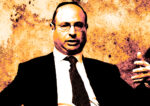A Chinese-Canadian businessman with a checkered past dropped a legal fight with the receiver of a struggling Chicago landmark in a move that avoids risks of he and his attorney getting hit with further sanctions.
The contentious foreclosure case between an entity controlled by Xiao Hua “Edward” Gong and a court-appointed receiver overseeing the 38-story Pittsfield Building in the East Loop ended with a settlement approved by a judge late last month.
The settlement requires the Gong-controlled entity that previously owned 30 of the floors in the Pittsfield building at 55 East Washington Street to make payments of an unknown amount to the receiver, Chicago-based Courtney Jones.
Gong bought his stake in the building — the tallest in Chicago when it opened in 1927 — out of bankruptcy from a previous owner for about $20 million in 2017.
His settlement agreement sealed a recent $8 million sale of the property and put to rest a motion Jones had made to pursue court-ordered sanctions against Gong and his lawyer. Jones alleged Gong had engaged in unnecessary stall tactics employed in a last-ditch effort to nullify a court-ordered sale of the tower.
The conundrum illustrates the risks real estate players take when they employ certain tactics — such as claiming they weren’t properly served legal papers or accusing a court-appointed receiver of shady business practices — in attempts to prevent the seizure of their properties.
An attorney for Jones declined to comment and an attorney for Gong — who earlier this year spent $700,000 in an unsuccessful run for mayor of Toronto — did not return requests for comment.
Both Jones and Gong flung accusations at each other as the court allowed the receiver to sell the property, which for decades has apparently needed new investment for a turnaround. In May, a Michigan-based newcomer to downtown Chicago’s real estate market, Tom Liravongsa, emerged as the buyer of the 30 out of 38 stories that Gong previously controlled.
That receivership sale arose from a dispute that began as a result of a criminal investigation into Gong by Canadian authorities. Jones was appointed as a receiver for the building in 2020, three years after Gong had been charged with securities fraud and seen his assets frozen.
In 2021, Gong was reinstated as the controlling owner of the Pittsfield after making a deal with Canadian authorities that required one of his companies to plead guilty to operating a pyramid scheme.
But Jones and other businesses claimed they never got paid for services and other work related to the Pittsfield Building while Gong was held up by the criminal case. Jones sued, demanding about $5 million. A Cook County judge ruled Jones was owed $6.8 million and he was allowed to seize the property, letting him flip it to the Liravongsa venture for about $8 million.
After Gong and his representatives failed to appear in the foreclosure case before a judge entered an order in favor of Jones, the former landlord filed lawsuits challenging the legitimacy of the court process, and accused Jones of being wrongly enriched to the tune of $1 million in the deal. Gong claimed he wasn’t properly served during the foreclosure proceedings and filed a motion for a temporary restraining order to try and stop the sale.
The court ultimately declined to stop or reverse the sale to Liravongsa. Once that deal was complete, Jones and his legal team pursued sanctions against Gong for moves they said he made to cause frivolous delays and attorneys costs.
Gong said his legal maneuvers were simply attempts to hold onto his property and employ his rights as a landlord.
Jones’ motion for sanctions asked the court to “punish (Gong) for attempting to preserve its right to fully litigate the propriety of service of the foreclosure summons and process,” an attorney for Gong wrote in court filings.
Gong and his team only learned of the sale to Liravongsa on March 28, which was months after the court had approved a sale, they said. Gong’s lawyers also argued that Jones didn’t serve the right registered agent for Gong’s LLC that owned the building.
“These assertions contradict the record, including (the former landlord’s) multiple sworn statements to the Illinois Secretary of State,” Jones said in support of pursuing sanctions, before settling the matter with Gong.
Elsewhere in Chicagoland, in the deep northwest suburb of Harvard near the Wisconsin border, a medical glove maker is preparing to start up manufacturing in a facility on a 325-acre property once owned by Gong, the Northwest Herald reported in June. That property, once set to house Motorola offices and manufacturing, was seized during Gong’s criminal case and sold off to a Las Vegas developer by the U.S. Marshals as part of the court process.
Read more



